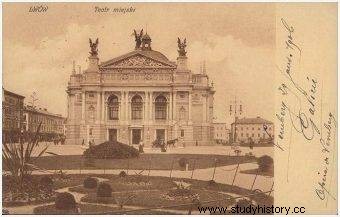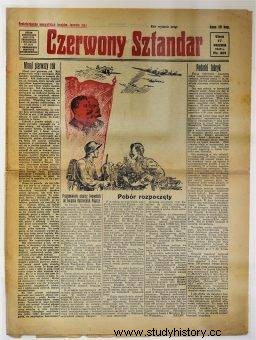Soviet cleanup after September 17, 1939 on the so-called Borderlands are rightly associated with deportations to the East and other repressions against Poles. However, on the other hand, Lviv was the only center of Polish science and culture in the territory of the Second Polish Republic. There were schools, universities, theaters, and the press was published in Polish.
The Soviets pursued a two-track policy towards the inhabitants of the eastern territories of the former Second Polish Republic. Trying to neutralize those they considered enemies and win over others. The greatest enemies were former officials, officers, policemen, politicians of the Polish state. The group of "class enemies" also included entrepreneurs, wealthy townspeople, lawyers . Terror and repression as a permanent element of the Soviet rule began with arrests, sometimes murders, immediately after the entry of the Soviet troops, followed by the NKVD. The most mass repression was the deportation of Polish citizens to the eastern areas of the USSR:to Siberia, to Kazakhstan - they involved 325,000. up to 800 thousand people.

The city theater in Lviv in a postcard from 1905
"Whoever does not work, does not eat", Włodzimierz Lenin liked to repeat after Paul the Apostle. Work in the Soviet state was provided by the state, and employment was not only related to a (very low) salary, but also to food allowances, the right to housing, and a lower risk of becoming a "social pest". So you had to have a job to survive. The Soviet authorities, having these arguments behind them, also tried to win over the intelligentsia.
Schools and universities were opened. Someone had to teach. Acquiring pre-war professors gave the authorities more legitimacy than entrusting these tasks to immigrants from the East . When it comes to winning over the Polish intelligentsia, the communists tried to do it very subtly.
The most important thing:survive and survive as a nation
Lviv hoped that an Allied offensive would start in the spring, which would end not only the German but also the Soviet occupation. It seemed almost certain, we only had to wait for spring. Meanwhile, terrifying news was coming from the German occupation zone about mass shootings, arrests of professors of the Jagiellonian University, and the destruction of Polish culture . "Under the Soviets" was a bit different, but also not easy:universities were affected by Sovietization, this was especially true of filling posts with newcomers from the East, and the creation of new departments:Leninism, Stalinism and others.
Lviv was an enclave in the field of education for Poles. Ukrainians were the most numerous group among 9,000 students, but the next were Poles, who even predominated in some fields of study. In the Lviv region, there were 314 primary schools with Polish as the language of instruction and over a thousand with Ukrainian. There were 20 Jewish schools left. In Lviv alone, 7 secondary schools were taught Polish.
The only center of Polish culture
With all the restrictions, repression and indoctrination on the part of the Soviet invader, Lviv at that time appeared to be practically the only center of Polish culture and science in the lands of the Second Polish Republic. In contrast to most of the borderlands, the Polish intellectual elite remained in Lviv . Polish professors and writers gave lectures at local universities.

Władysław Tadeusz Wisłocki, Polish Slavist, librarian, bibliographer, curator and director of the National Institute Ossoliński
The Ossolineum started working the day after the Soviets entered Lviv. The temporary management was taken over by Mieczysław Gębarowicz, Kazimierz Tyszkowski and Władysław Tadeusz Wisłocki. The Institute took over the collections of landowners, monasteries and private libraries to protect them. The head of the institution from November 1939, Jerzy Borejsza (publicist, writer, publisher, political activist with a communist orientation) sought to create a center for Polish studies with the Ossolineum and establish the Polish Literary Institute. Borejsza has provided many Polish scientists with an opportunity for research.
The situation of the creators worsened when there were arrests among them incl. Władysław Broniewski, Aleksander Wat, Teodor Parnicki. Professors Edward Dubanowicz and Stanisław Głąbiński were displaced to Kazakhstan.
Soviet thaw
In the second half of 1940, the Soviet policy towards Poles softened. At the behest of Stalin himself, attempts were made to recruit Poles. The Polish language was treated better, previously dismissed people were hired . The change of policy was limited to academia, creators, journalists only.
The changes appeared in "Czerwony Sztandar", a Soviet daily published in Polish. People started writing about Polish matters, including culture. In 1940, "Midsummer Night's Dream" and "Krakowiacy i Górale" were included in the repertoire of the Lviv State Dramatic Theater. Eighteen Lviv scholars at the invitation of the Soviet authorities visited Moscow . Separately, this trip was made by the former prime minister, prof. Kazimierz Bartel.

Red Banner
Various memories from that period show that the fear of an uncertain tomorrow, arrest and deportation was overwhelming. Working at the University or in the theater protected against this to some extent, but not always. For this cooperation, motivated by fear and an intellectual sense of duty towards Polish culture and Polishness in general, these people paid a high price .
Nothing is black and white in this story. The aforementioned Borejsza, associated with the communists, who was easily labeled as a collaborator, saved the Ossolineum collections and gave asylum to Polish researchers. In turn, Jan Kott recalled that Wanda Wasilewska led out, among others, him and Boy from the transport to be taken away. In this way, it saved several dozen people of culture and science from deportation.
Celebrating the anniversary of Mickiewicz's death, a trip to Moscow, Polish repertoire in theaters, Polish professors and students at Lviv universities - this life went on in parallel with another, marked by arrests or deportations. So the accusation of collaboration quickly emerged. It was often formulated by the steadfast, who rushed along the "Zaleszczyce road" to Romania, then found a safe haven in the West. The accusation of outstanding people is also, especially for the less prominent, a real opportunity for retaliation. Tadeusz Boy-Żeleński, who was so eagerly accused of collaboration, was one of the main ideological enemies of the nationalist-clerical right and the clergy themselves . It is also difficult to assess this period, if only because it has not been thoroughly researched. Such "steadfastness" (sometimes post factum ) is also part of the Polish tradition.
